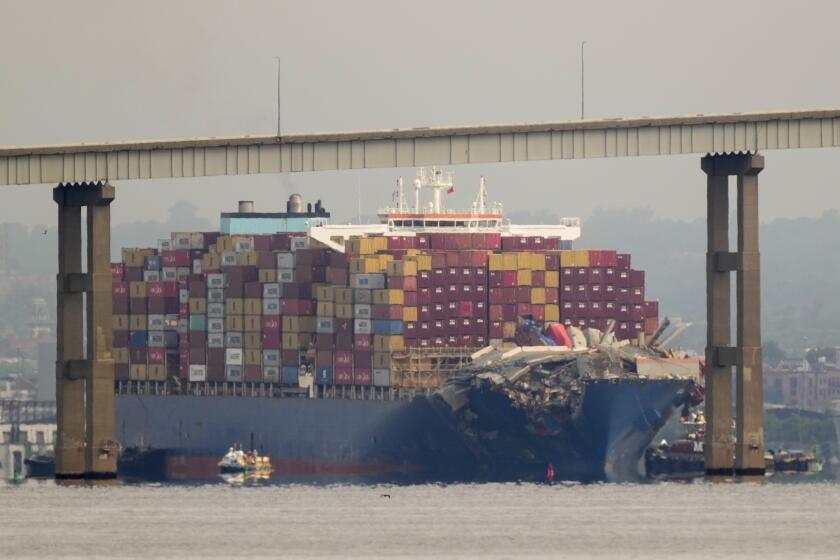PERSPECTIVE ON FREE TRADE : A Hand for Mexico, a Slap for Us : It’s not true that U.S. workers will reap secondary benefits. Mexican workers won’t be helped much, either.
A U.S.-Mexico free-trade agreement would confirm present trends--opening Mexico’s economy to U.S. investment and the relocation of U.S. manufacturing to Mexico. Already, half a million workers in Mexican maquiladora plants make products for export to the States. Mexican rules restricting foreign (i.e., U.S.) ownership of factories have been nearly abolished. U.S. automobile firms now operate more technologically sophisticated plants in Mexico than they do at home. Much of California’s furniture industry has relocated to Tijuana. Japanese and Korean consumer electronic firms have gained easier access to U.S. markets by establishing low-wage (but high-quality) factories in Mexico.
Meanwhile, and partly as a consequence, the U.S. manufacturing sector shrank from 23% of domestic employment in 1979 to 18% last year. This employment loss can only grow with free trade. So why does the Administration pursue an agreement?
Advocates offer two rationales, neither of which stands much scrutiny. First, they claim that free trade would open Mexico’s market to American sales, creating economic growth at home. They speak of “80 million consumers” in Mexico, warning that without free trade, Japanese or Europeans, not Americans, could capture this enormous market. But low-wage markets are no bonanza. Mexican wages average $1 an hour and have been declining. “Consumers” earning only $1 an hour don’t consume very much beyond the basic necessities.
Expanded free trade will probably further depress Mexicans’ purchasing power because it will restrain traditional government industrial-protection policies and foster maquilarization of wages throughout the economy. It is no accident that wages in Mexico’s maquila export sector (as low as 60 cents an hour) are substantially below wages in firms serving Mexico’s domestic market.
Free-trade proponents claim that 80% of every peso paid to maquila workers is spent either in U.S. border communities or on U.S. products. Thus, they argue, U.S. manufacturing in Mexico benefits us as well. This makes little sense. When a $10-an-hour job in Detroit is replaced by a 60-cents-an-hour job in Tijuana, it is ludicrous to suggest that U.S. workers benefit because 48 cents is then spent in San Diego.
Free-trade supporters also argue that moving basic manufacturing to Mexico supports higher-paying jobs at home. “Every time you put a plant in Mexico, it creates new jobs in the United States because we are the suppliers, the transporters and the managers of the plants in Mexico,” said Commerce Secretary Robert A. Mosbacher Sr. in Los Angeles last month.
The Mattel Corp. recently announced that it would expand its toy assembly in Mexico, employing several thousand more Mexican workers. This, it claimed, would benefit California because the assembly operation would depend on skilled injection-molding jobs here.
This argument is contradicted by two decades of experience. Almost invariably, manufacturers claim that only basic assembly will relocate. Yet just as invariably, once Mexican basic manufacturing is running smoothly, higher-skilled jobs follow. Why shouldn’t they? Mexican workers are no less skilled than their American counterparts (and robotization is more advanced in some Mexican manufacturing). Mexican universities and technical schools graduate increasing numbers of managers, engineers and skilled workers. And there are substantial inventory, transportation and quality savings gained by locating supply and design operations close to assembly plants they support.
The maquila sector now hosts high-tech firms as well as assembly plants. Westinghouse, for example, makes the F-16’s guidance systems in Chihuahua. When Mexico’s border industrialization zone was established 20 years ago, its main activity was sewing garments. Today, 39% of all maquila plants make electronics; apparel represents only 9%.
In truth, we are pushing a free-trade agreement more for political than economic reasons. The Bush Administration is more responsive to manufacturers seeking Mexico’s low wages than to their U.S. workers facing layoff. It is more open to financing ventures that seek Third World manufacturing profits than to competing claims of a starved infrastructure and technological advance at home. The Administration also is responsive to retailers who expect low-cost imports to generate higher profits. While that’s true in the short run, declines in U.S. purchasing power resulting from the loss of high-wage manufacturing could spell doom for mass retailers. It is ominous that the average hourly wage in the United States has declined almost 10% since 1980, due in part to replacement of high-wage manufacturing by service and retail employment. Farsighted retailers can take no comfort from this statistic, whatever temporary benefit they gain from cheap imports.
The Bush Administration, characteristically more interested in foreign than domestic policy, sees an opportunity to bolster Mexico’s President Carlos Salinas de Gortari, who has staked considerable prestige on the quest for free trade, hoping it will stimulate U.S. investment in Mexico and remove temptations that U.S. investors might feel to send excess capital to developing markets in Eastern Europe. However, both Bush and Salinas would be well advised to pay more attention to the benefits of higher wages in both nations, and less attention to short-term profits gained from competitive impoverishment.
More to Read
Start your day right
Sign up for Essential California for news, features and recommendations from the L.A. Times and beyond in your inbox six days a week.
You may occasionally receive promotional content from the Los Angeles Times.






